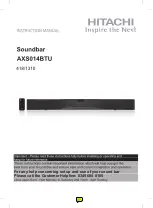
NILES AUDIO CORPORATION – 1-800-BUY-HIFI – 305-238-4373
7
connection, but you will want to do one of two things:
a.
Plug it into the switched outlet of the receiver, or
b.
Use a Niles AC-3 Voltage Triggered Power Strip connected to one of
the assignable 12V outputs on the HT-MSU. Use the QuickConfig PC
Configuration Software to program the assigned 12V output to turn on
when that source is selected. (See QuickConfig
manual for more details on
programming 12V outputs.)
Along the top edge of the HT-MSU are the source-specific status connections labeled
SRC1 through SRC6. These RCA jacks are designed to sense either 12 Volts or video
so the HT-MSU “knows” when the source is On or Off. You must use these connections
if the source you are trying to automate is IR controlled and uses toggle power
(see
1.Toggle Power
above).
If the source has a video out jack, connect the video output to the corresponding SRC
Status RCA jack on the HT-MSU. If the source has no video output jack, you may use one
of the Niles external-sensing devices that provides 12V output (i.e., the CS12V Current
Sensor or the LS-1 Light Sensor) connected to the RCA Status jack.
ASSIGNABLE 12 VOLT OUTPUTS
These three ports are completely assignable and can be used to trigger out-board automation
devices such as:
• 12V Triggered AC Power strips like the Niles AC-3
• 12V Triggered subwoofers like the Niles SW300, SW12, SW10, and Pro15SW
• 12V Triggered Dipole/Bipole rear effects speakers like the StageFront IW650FX
• Motorized drapery systems and projection screens
12V Output #1 has a default setting to output 12V DC whenever the home theater receiver is turned
on by the HT-MSU Master Key activity setting.
12V Output #2 has a default setting to output 12V DC whenever the HT-MSU Master Key activity
setting turns on the TV.
12V Output #3 has no default and is completely assignable.
The three assignable 12V outputs can be configured (programmed) using the Niles QuickConfig
PC Configuration Software.
ASSIGNABLE RELAYS
There are three independently assignable dry contact closures/relays. These connections can be
used to trigger lights, curtains, screen lifts, and other devices. Use the Normally Open or Normally
Closed side of the contact closure to complete the circuit to control the device.










































